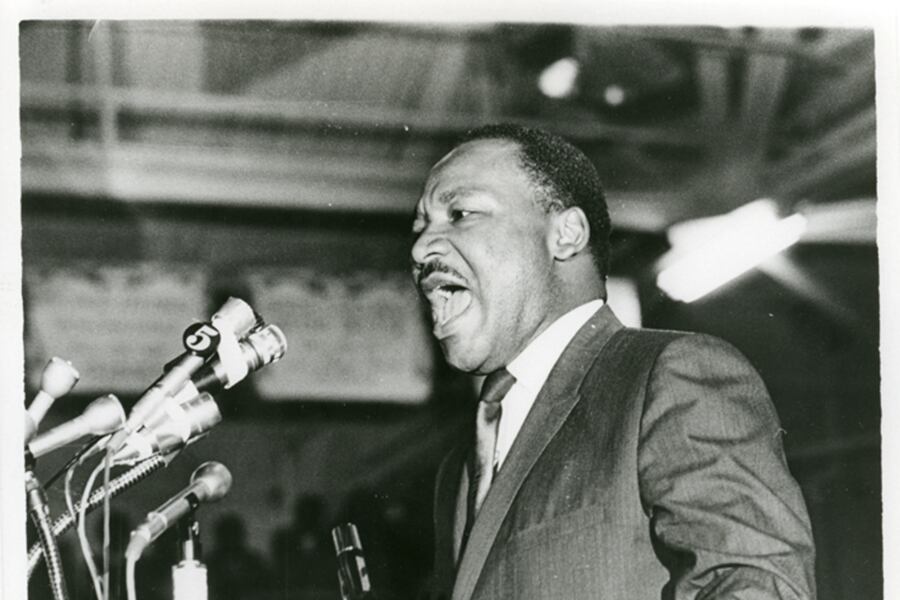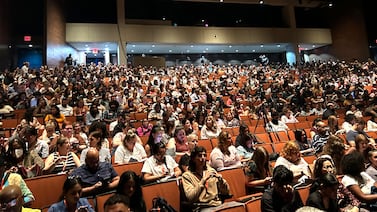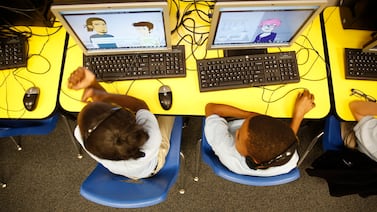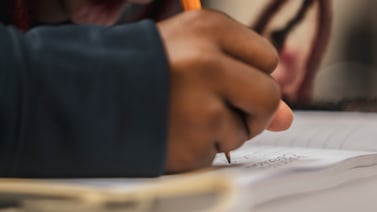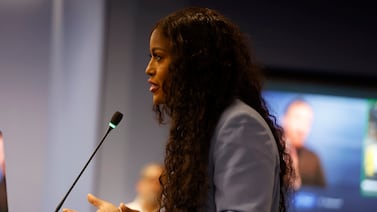Editor’s note: This article has been updated to remove material that appeared verbatim on Wikipedia.
Khym Lawson remembers when Martin Luther King Jr. was assassinated in Memphis, Tennessee, on April 4, 1968, and recalls the widespread grief and riots that followed in Philadelphia.
“I remember we lived on 26th Street in North Philadelphia and all the people were outside,” she said. “I was at home watching TV and remember how upset people were.”
Lawson, who is the president of the Associated Alumni of Martin Luther King High School, graduated from the school in 1979 in its third graduating class. She’s proud to be a graduate of a school named for the civil rights hero.
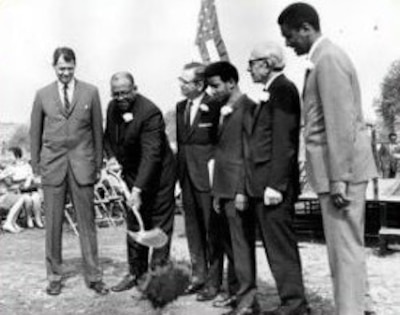
Every year around Jan. 15, King’s birthday, educators across the United States honor his legacy by teaching about civil rights leaders and holding larger discussions about race in America and Black Lives Matter. This year, with the unrest following the deaths of unarmed Black men at the hands of police and the racist rhetoric of the 2020 election, those conversations are taking on heightened importance — particularly at King’s namesake school in the West Oak Lane section of the city.
The school will host the city’s annual day of service on Monday, the Martin Luther King Jr holiday, in conjunction with State Rep. Stephen Kinsey, Grace Baptist Church of Germantown, IVEE, and the school alumni association. The day usually includes a performance by the Philadelphia Orchestra, but due to the pandemic it’s been scaled back to include COVID-19 testing and free meals.
Originally, MLK, or King, as the students and community call it, was going to be named Northwest High School. After King’s death, the school district decided to name the new high school in tribute to him after demands were made to name a new structure that represented the Black community.
When MLK opened at 6100 Stenton Ave., it was joined with Germantown High School as Germantown/King. The ninth and 10th grade students attended MLK, while older students went to Germantown.
In 1976, Germantown and King became separate schools accommodating grades nine through 12. The campuses are about a mile apart. After Germantown closed its doors in 2013, its students began attending MLK.
“We also want people to understand that it’s not King High School — it’s Martin Luther King High School,” Lawson said. “It’s about the man and his legacy and has nothing to do with a gold crown. It’s about the legacy, it’s about the community, it’s about the children. No matter what race, creed or color.”
Five decades later after King’s assassination, the neighborhood school is fighting to provide a high-quality education. Forty percent of its students receive special education services, and 8% come from residential treatment facilities or have been discharged from places such as the Juvenile Justice Center, said Principal Keisha Wilkins.
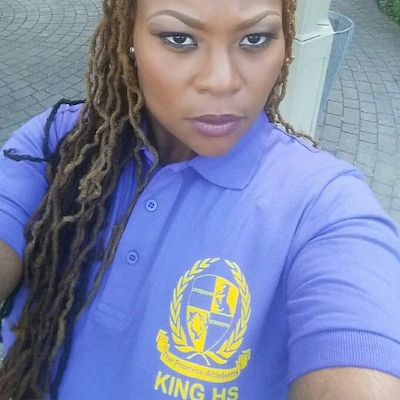
“We just need better resources to educate those children,” Wilkins said. “So the conversation that we have with our children is, ‘If somebody is not giving it to you, you have to figure out how to get it on your own.’ It’s not just about intelligence but about building character.”
Wilkins said having King’s name on the school is a big deal. “We want to exemplify not only who Martin Luther King was as a person, but the legacy and history of the school,” she said.
Teachers Angela Crawford and Stephen Flemming feel it’s imperative for their students to understand current social justice issues, too.
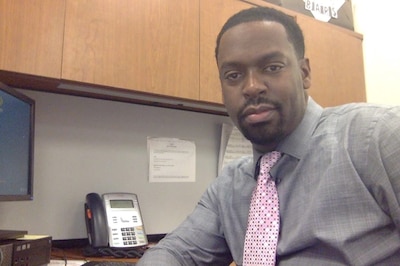
“A lot of what the late John Lewis said would probably be what King would say if he were alive today, and that is ‘Speak up, stand up, don’t sit around,’ ” Flemming said. He and Crawford have made it a point to discuss Black Lives Matter, the police killing of Walter Wallace, and the invasion of the U.S. Capitol with their students.
“It’s always a privilege and honor to teach students who look like me,” Crawford said. “My teaching is about bringing the greater consciousness of who we are with extra care and cultural responsibility.”
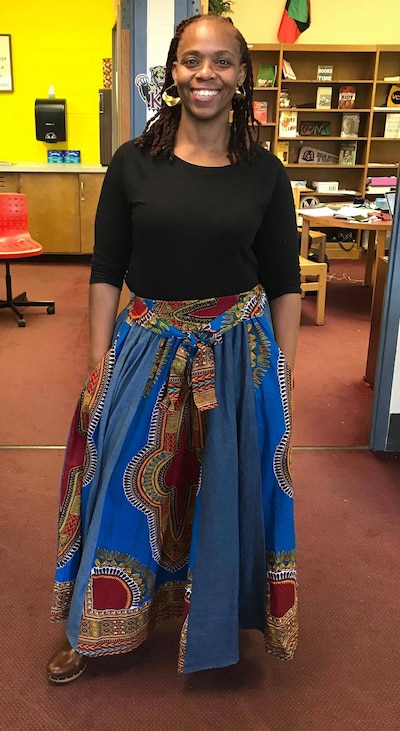
Athletes at MLK also are encouraged to strive hard. Malik Jones, who graduated from MLK in 1997, returned to his alma mater in 2016 as an assistant coach and later head football coach. In his first year, Jones led the team to win the 5A Public League Championship. More than 20 of his athletes have earned college scholarships.
“What attracted me to coaching was giving back to the school that helped these students find their way in life,” Jones said. “In this role I have an influence on young Black boys and help them get to better opportunities.”
Jones said when he returned, the school began to get away from the civil rights activist’s name and more toward what resembled symbols of royalty. “When we got our championship jackets, we had them to say MLK and to reinvigorate his name,” Jones said.
The school’s library is being renovated as part of Mayor Jim Kenney’s Community Initiative and will be a community hub. “We are working to build a community library, where not just the kids from King can use, but the folks in the community can come and have access to resources,” Wilkins said.
The seniors in Crawford’s English class want to become doctors, engineers, and even comedians. They vow to fight the way they feel they’re perceived by being MLK students and plan to succeed and uphold King’s legacy.
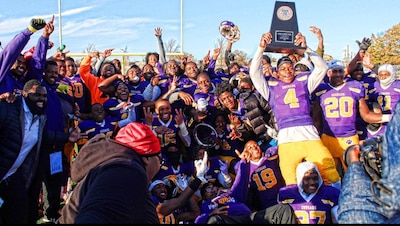
MLK senior Simiya Sawyer feels that she’s judged as a problem student because she attends MLK, but won’t let it deter her. “I see myself helping people,” she said. “I want to create a home for teens. And not just teens, but families and anybody who needs it. I also want to be a nurse. Just to help my community and help the homeless. Make someone else’s life better.”
Another senior Shane Carter said he’s aware of King’s legacy. “In terms of rights we have today, I feel grateful for what he has done.”
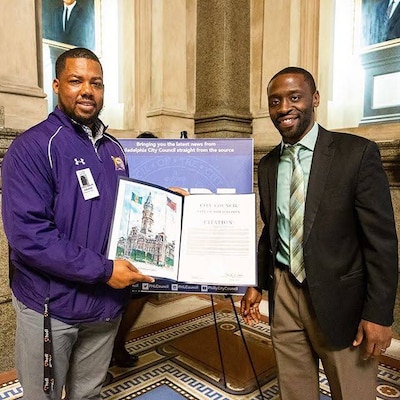
Senior Cailin Stringer, who is a native of King’s home state of Georgia, said being Black and growing up in the surrounding community has given her purpose to give back and volunteer to help others.
“Me going to King doesn’t mean that I have to,” she said. “I have to regardless.”

